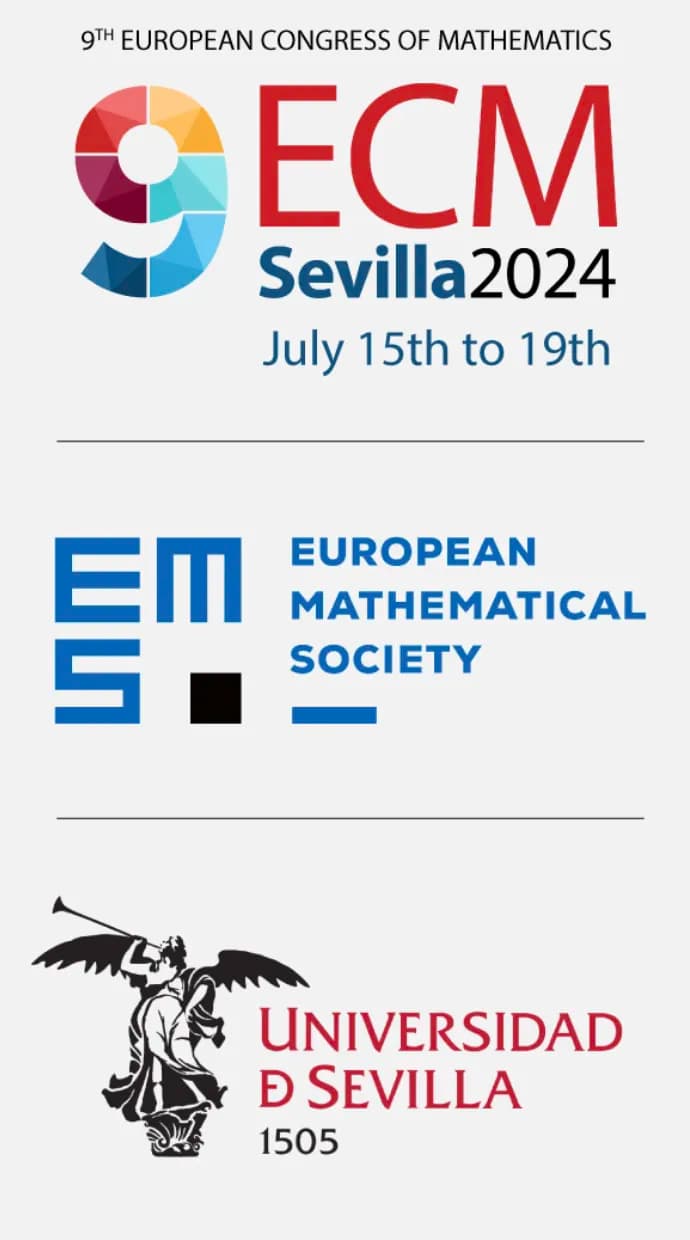The 9th edition of the ECM in Sevilla ended last week and it was one to remember!
The ninth edition of the European Congress of Mathematics (ECM) attracted almost 1400 participants, exceeding the number of participants at previous editions. The Organizing Committee delivered a conference of high scientific content, with a particular focus on inclusivity, as demonstrated by the 120 scholarships awarded to young mathematicians and to those from developing countries who did not have the means to attend.

The weekend before the Congress, the EMS Council met in Granada. One of the main outcomes of the Council Meeting was the selection of Bologna as the venue for the next ECM, to be held in 2028. In addition, several members were elected (or re-elected) to the EMS Executive Council: Jorge Buescu and Victoria Gould as Vice-Presidents, Jiří Rákosník as Secretary, and Barbara Kaltenbacher, Adam Skalski, Susanna Terracini, Alain Valette and María Ángeles García-Ferrero as members, the latter as representative of the EMS Young Academy.
The first day of the ECM began with the opening ceremony at the Maestranza Theatre in Sevilla, where 14 prestigious mathematical prizes were awarded by the European Mathematical Society. These included ten EMS Prizes, awarded every four years to young mathematicians under the age of 35 in recognition of their exceptional contributions to mathematics; the Felix Klein Prize, awarded to mathematicians under the age of 38 for «solving (...) a concrete and difficult industrial problem»; the Paul Lévy Prize, for outstanding contributions to probability theory and its applications; the Otto Neugebauer Prize, for original and influential work in the field of history of mathematics; the EMS/ECMI Lanczos Prize, for the development of outstanding mathematical software. The opening ceremony set the stage for a congress full of activities, including 10 plenary conferences, 2 special sessions, 64 mini-symposia, 270 thematic communications, and 4 informative conferences, as well as invited lectures, workshops, and 4 cultural exhibitions.
On Tuesday morning, the ECM continued with a series of remarkable events: Avi Wigderson gave the Abel Lecture on The Value of Errors in Proofs, followed by plenary lectures by Vlad Vicol on Anomalous Diffusion and Eero Saksman on Gaussian Multiplicative Chaos in Random Geometry and Analytic Number Theory. The afternoon included the Felix Klein Prize lecture by Fabien Casenave, the EMS Prize lectures by Jessica Fintzen and Tom Hutchcroft, and two panel discussions: Translating European Mathematics, organized by ICMAT-ICHM, debating how accurate translations facilitate knowledge sharing, and the European Research Council Panel, highlighting how mathematical research, being very transversal, can further increase its funding.
On Wednesday the Congress began with plenary lectures by Annalisa Buffa on the impact of geometric simplification simulation of PDEs, Martin Bridson on infinite groups, and Tamar Ziegler on the sign patterns of the Mobius function. Highlights of the afternoon were the EMS Prize lectures by Jacek Jendrej and Richard Montgomery, and the Otto Neugebauer Prize lecture by Reinhard Siegmund-Schultze. The day included two panel discussions: New scenarios in open science, organized by the Centre de Recerca Matemàtica, which discussed the current regulatory, research and editorial aspects of Open Access, and Celebrating and supporting women in mathematics, organized by European Women in Mathematics (EWM).
Thursday morning started with a plenary lecture by Andre Neves on Recent progress in the theory of minimal surfaces, followed by the Hirzebruch Lecture by Étienne Ghys and a plenary lecture by Benny Sudakov on Restricted subgraphs of edge-colored graphs and applications. Afternoon activities included the EMS/ECMI Lanczos Prize lecture by Patrick Amestoy, and the EMS Prize lectures by Nina Holden, Adam M. Kanigowski, and Danylo Radchenko. The Institute of Mathematics of the University of Seville organized the panel The Role of Institutes of Mathematics in the Advancement of Mathematical Research; the EMS Young Academy proposed a horizontal panel consisting of a group discussion on sustainability - environmental and mental - in the academic career.
On Friday, the last day of the ECM, the congress began with plenary lectures by Fabio Toninelli on the behavior of super-critical stochastic PDEs, by Maxim Kontsevich on the generalized Riemann-Hilbert correspondence, and by Anna Wienhard on hyperbolic geometry. The afternoon featured the EMS Prize lectures by Cristiana De Filippis, Frederick Manners and the Paul Lévy Prize lecture by Jeremy Quastel. The congress concluded with a crowded closing ceremony, celebrating a week of mathematical insights, with congratulations and encouragement for the organizers of the 10th ECM in Bologna.
Tweet Share